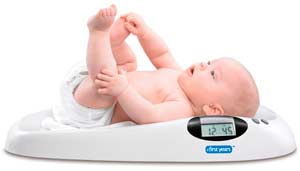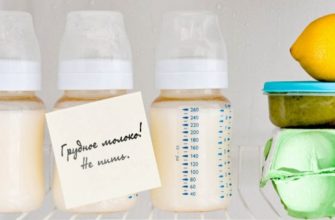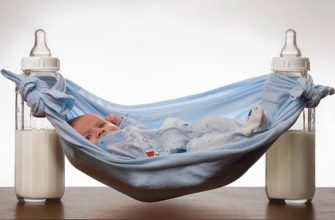The baby was born. The happy mother comes the time of worries, worries and worries. The main thing that concerns a mother who is breastfeeding now is whether the baby receives enough nutrition, fatty or not very milk?

Breast-fed
First feeding
Milk after birth usually begins to arrive by the fourth day. The baby is brought on the first feeding most often on the second day. And so the young mother begins to worry that her baby will remain hungry, that there is very little milk. Doing this is not worth it for several reasons:
- The newborn is still weakly sucking his mother's breast (the sucking reflex is poorly developed), he needs to learn this, so he eats very little.
- Colostrum, which is now produced by the mother’s body, is oily and nutritious. It contains everything you need to ensure the full functioning of the newborn.
- The volume of the ventricle in the baby is still very small (only about 10 ml on the first day), therefore the amount of colostrum eaten during one feeding is also small, about 7 - 9 ml.
- It turns out to feed the child 10-12 per day, that is, in the first day the baby's norm is about 100 ml of milk.
- Do not think that the baby will remain hungry because there is not enough milk. Soon it will begin to arrive. But unnecessary anxiety can delay the increase in lactation.
Milk rates in the first ten days
How much milk an infant eats, now depends only on its weight and age. From day to day, the volume of the ventricle in the newborn increases, and the volume of milk consumed increases accordingly.
- On the second day, the baby already drinks about 20 grams per feed, the daily dose is 200-240 ml,
- In the third, 30 ml (300-340 ml, respectively) and so on.
- For the baby in the first 10 days of life, you can calculate the required amount of milk consumption per 1 feeding, simply by multiplying the number of days by birth by the number 10.

More precisely, the volume of a single dose of milk consumed can be determined by weighing the infant on a medical scale before and immediately after feeding. The difference between the weighing results - this is the volume of milk consumed by the baby.It is advisable to weigh several feeds in a row. Knowing the approximate dose (see above norms), you will understand whether the baby sucks his portion or not.
When and how best to feed the baby?
Ten days later, mom’s milk will stop arriving. Now, the approximate amount eaten per day will be equal to one fifth of the weight of the baby.
Children's pediatricians came to the conclusion that it is not necessary to force-feed a child in strictly allotted hours.It is better to wait until the baby himself will demand to feed him. Usually this happens 10-12 times a day with an interval of 1.5 - 2 hours.
As a rule, the baby actively sucks the breast for 15-30 minutes, sometimes even 40. It happens that the baby sucks all the milk, but continues to suck the breast for some time, either sucking the last drops of milk, or he just likes the process of sucking. Do not let him suckle for more than an hour.
Nutrition table up to a year
| Child age | The amount of milk eaten per feed, ml | The amount of milk eaten per day |
| 3-4 days | 20-60 | 200-300 ml |
| Week 1 | 50-80 | 400 ml |
| 2 weeks | 60-90 | 20% of the mass of the child |
| 1 month | 100-110 | 600 ml |
| 2 months | 120-150 | 800 ml |
| 3 months | 150-180 | 1/6 mass of the child |
| 4 months | 180-210 | 1/6 mass of the child |
| 5-6 months | 210-240 | 1/7 mass of the child (800-1000 ml) |
| 7-12 months | 210-240 | 1 / 8-1 / 9 of the mass of the child |
Artificial Nutrition
Everything mentioned above is related to breastfeeding. And if your child receives artificial nutrition? How to calculate the required rate of milk or mixture?
- Here the diet is important. It is necessary to feed the baby at least 8 times a day.
- We expect the norms, as well as for breastfeeding, but if the baby eats less often, then the norm can be slightly increased.
- The main thing is not to overfeed the child. Indeed, it is easier to suck milk from the nipple, and the baby’s sucking reflex is already developed a few days after birth.
- If you are feeding your baby not with milk, but with milk mixture, then it’s still easier - the package shows the dose required for each age (See the article on mixtures and how how to choose a mixture for a newborn).
How to calculate the daily norm for artificial nutrition?
Let's see how to calculate the required amount of food per day for a child - an artificer up to a year? This table will help.
| Age | |
| From 10 days to 1.5 months | 1/5 of the baby’s weight |
| From 1.5 months up to 4 months | 1/6 part of the baby’s weight |
| From 4 to six months | 1/7 part of the baby’s weight |
| From six months to 8 months | 1/8 part of the baby’s weight |
| From 8 months to a year | 1/9 part of the baby’s weight |
Features of nutrition during artificial feeding
- Do not worry if the baby has eaten less than the norm - the next feeding, he can eat a little more and get the right amount.
- You should know that the baby’s ventricle on artificial feeding slowly digests food, whether it is milk or a mixture. Therefore, during the day it should be fed after 2.5 - 3 hours, the night break in feeding can be 5 - 6 hours.
- If the baby wakes up some time after feeding and cries, do not feed him yet. Most likely, he did not burp the air, and his stomach hurts. Hold it upright. As soon as he burps the air, let me fall asleep again.
- If he didn’t drink all the norm, it’s better to give it a drink later, when you know for sure that he is hungry.
How to determine that a child is full?
An attentive mother, in many ways, will determine that the baby is full:
- He is calm;
- Fast asleep;
- Gains weight well (See article about weight gain);
- He writes regularly (12-15 times a day) and regularly poops (See article how many times does a newborn poop daily).
When a child simply cries often, this is not an indicator of underfeeding. Most likely, he is simply tormented by gases and colic.
Video: how to determine if a child has enough milk
There are many tips for breastfeeding, but do not blindly follow them.Remember that everything is very individual. Be attentive and patient, and soon your baby will have his own diet convenient for him.
It should be remembered that for anyone, whether breastfeeding or artificial feeding, you must definitely give your baby a drink of warm boiled water (See article should a newborn drink water).
As soon as the feeding regimen becomes normal, you can not worry about how much your baby ate. He himself will eat as much as he needs.









I fed at the request of both children. I did not have the opportunity to weigh after each feeding, and I did not have this table. I watched how the children grow and develop, and made inputs about the volume and frequency of feeding. They definitely lacked, even more than) Of course, it was often difficult to understand whether a child has a stomach ache, or if he wants to eat. Offered breasts. I ate with pleasure - it means I wanted to eat, refused and cried - it means my stomach hurt ... Something like that)
Absolutely completely agree with this article, the mother herself, and was faced with questions about breastfeeding, the benefit is that the specialist in GV in the hospital had a good one, she explained everything correctly. My daughter was born 3.2 kg, in the first month she gained 2 kg, although she ate mainly after 2-3 hours. The good news is that your own knowledge coincides with this article.
Now the situation is already slightly different than what is written in the article. If the birth is natural, then the newborn should be attached to the chest already in the delivery room. After that, the baby is in the same room with his mother all the time he is in the hospital and can be fed on demand without any problems. Pediatricians in the hospital strongly insist on giving supplementary nutrition, as the child loses weight in the first days. This is normal, do not enter into their provocations, by 5-6 days the child’s discharge will return to normal!
From birth, I breastfeed on demand. In the first months he could eat one and a half to two hours, but then the regime was more or less established and now it takes about 30 minutes maximum. True, I do not drink water. The pediatrician said that up to six months, only breast milk should be given. Apparently, how many specialists have so many opinions.
Very helpful article.
Something I do not agree with this article at all.
The child became moody, he demanded to eat endlessly, opened the article - DO NOT EAT (we ate 110 ml 7 times). Outcomes from the calculations are 2.5 months. weight 6400 (born 4250) 1/6 = 1066 g per day 7 times = 152 ml.
The first thought - that’s why we demand to eat, began to gradually increase. Bottom line: tantrums mutilated at times, began to vomit very strongly once a day 20 times, problems with the tummy. They called their pediatrician - they scolded us, they said, and so we sort out.They calculated for us the norm, the norm for us is -100 ml at a time, -7 meals a day and to drink with water before feeding and between feedings.
The tummy is adjusted - 100 ml is enough (we even sort out a little weight) and blow out 250 ml of water per day.
Articles are articles, and the pediatrician knows best what is best for your baby!
Katyushka, yes, you’re right, “Articles are articles, and the pediatrician knows better what is best for your baby!” In general, the child knows even better how much milk he needs 🙂
Thank you for the article !! Your site helps a lot! Of course, every child is an individual, but when there is no knowledge at all and there is nothing to be guided by, your advice, knowledge, experience helps a lot !!!! Thanks again !!!
My girl on IV from the third week after birth. And to whom, if not to me, how much time does she freely endure without feeding. 4 hours between feedings withstands freely, while ate 5 times a day - 200g. mixture, in its 6 months, height - 72cm, weight - 8300g - well, not at all small! At night, she also sleeps calmly for 7-8 hours and there is nothing surprising in this, since the mixture is really fuller than breast milk. I give Materna, the best food that we tried, took in baby1care. And colic almost did not bother her.